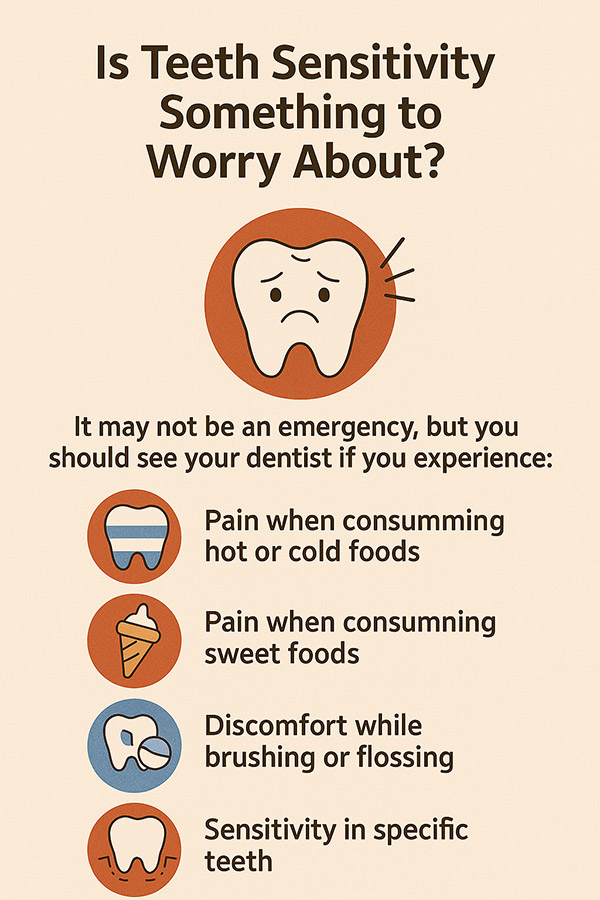That sharp jolt might be telling you more than you think.
A sip of ice water. A spoonful of soup. A bite of chocolate. If you’ve ever felt a sudden, sharp pain in your teeth during these everyday moments, you’re not alone. Tooth sensitivity affects millions of people—but what’s often misunderstood is how serious it can be. While some dismiss it as a minor inconvenience, it can be a signal of deeper oral health issues.
At All About Smile Dental Group, we regularly help patients in Chino, Encino, and Rancho Cucamonga understand the causes behind their sensitivity—and more importantly, treat it effectively. Whether it’s something as simple as switching toothpaste or as serious as addressing gum disease or tooth damage, knowing when to act makes all the difference.
“Sensitivity isn’t just annoying—it’s your mouth raising a red flag.”
What Causes Tooth Sensitivity?
Tooth sensitivity occurs when the protective layer of your teeth (enamel) wears away or when your gums recede, exposing the dentin underneath. Dentin is filled with microscopic tubules that connect to the nerves inside your tooth. When it’s exposed to hot, cold, sweet, or acidic foods, pain signals are triggered.
Some of the most common causes of sensitivity include:
- Brushing too hard or using a hard-bristled toothbrush
- Tooth grinding (bruxism), especially at night
- Acidic foods and drinks that erode enamel
- Gum recession, often from gum disease
- Tooth decay or cracked teeth
It’s also common to experience temporary sensitivity after dental treatments such as whitening or fillings. But if your discomfort persists for more than a few days, it’s time to speak with your dentist.

When It’s a Symptom of a Bigger Problem
While occasional sensitivity might not require urgent attention, persistent or worsening sensitivity can point to more serious issues. For example, if your sensitivity is localized to a single tooth or accompanied by swelling, discoloration, or bleeding gums, there could be decay, infection, or a cracked tooth involved.
At All About Smile Dental Group, we examine not just where the pain is, but why it’s happening. Our diagnostics include digital X-rays, gum measurements, and enamel evaluations to uncover the underlying cause—and build a treatment plan tailored to your needs.
Ignoring sensitivity can lead to complications, including tooth loss, nerve damage, and worsening periodontal disease. It’s always better to address these issues early.
“Pain is your body’s way of protecting you. Listen to your teeth.”
How We Treat Tooth Sensitivity
The good news? Sensitivity is treatable—and often manageable with simple changes. Depending on the cause, our treatment plan may include:
- Desensitizing toothpaste to block pain signals from the dentin
- Fluoride treatments to strengthen enamel
- Dental bonding or sealants to cover exposed roots
- Scaling and root planing if gum disease is contributing
- Nightguards for patients who grind their teeth
We’ll also guide you on best practices at home, like switching to a soft-bristled brush, reducing acidic foods, and improving brushing technique.
Preventing Sensitivity Before It Starts
As with most dental issues, prevention is the best medicine. Brushing twice a day with fluoride toothpaste, flossing daily, and keeping up with routine cleanings can go a long way in protecting your enamel and gums.
Be mindful of habits like aggressive brushing or drinking highly acidic beverages (soda, lemon water, etc.). If you’re a fan of whitening products, make sure to use them under the supervision of a dental professional. Overuse or misuse can significantly increase sensitivity.
Most importantly, don’t skip your regular checkups. At All About Smile Dental Group, we catch early signs of enamel wear and gum issues before they become painful problems.
FAQ: Tooth Sensitivity
Is tooth sensitivity permanent?
Not always. Many cases can be managed or even eliminated with the right treatment and home care.
Can sensitive teeth be a sign of a cavity?
Yes. If the sensitivity is limited to one area, it could be caused by decay or a cracked tooth.
Does whitening toothpaste make sensitivity worse?
Sometimes. Many whitening products contain abrasives or chemicals that can wear enamel. Always consult your dentist before use.
Can I still get cleanings if I have sensitive teeth?
Absolutely. Let your hygienist know beforehand—there are special tools and techniques to make your cleaning more comfortable.







